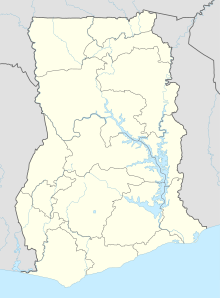Yendi
Coordinates: 9 ° 44 ' N , 0 ° 1' E
Yendi (also spelled Uendi ) is a city in Ghana .
It is known as the seat of the kings of the Dagomba and as a place of serious riots in 2002. Yendi is the capital of the district of the same name in the Northern Region .
location
The city is located on the Daka River in northeastern Ghana. It is around 400 km from Accra , the capital of Ghana, and around 50 km from the Togolese border.
population
Yendi has 51,727 inhabitants (as of 2010), mostly Dagomba. The Konkomba minority, who lived here until 1994 , largely left the city after the serious ethnic conflicts that ravaged the area that year.
Population development:
| year | Residents |
|---|---|
| 1970 (census) | 22,072 |
| 1984 (census) | 31,633 |
| 2000 (census) | 40,336 |
| 2010 (census) | 51,727 |
history
Royal city of Yendi
Yendi was founded in the middle of the 15th century by a ruler named Niakse as the capital of the Dagomba Empire . This empire ruled large parts of what is now northern Ghana from around the 14th century. At the time Dagomba had to pay tribute to the Ashanti Empire (from 1744) the Ashanti “commissioners” sat in Yendi and received the tribute there. Until 2002 the Gbewaa Palace was located in Yendi, the seat of the kings of the Dagomba, who also had great authority in modern Ghana.
Yendi trading center
Yendi was on one of the great slave trade routes, making it an important trading center for slaves. Among other things, the grave of a notorious and powerful slave trader, Babato , is a reminder of that time in Yendi.
Colonial Yendi
In contrast to most of today's Ghana, it was the Germans, and not the British, who carried out the colonial conquest of the city of Yendi (and the area adjacent to it to the east). At the end of the 19th century, Yendi - then also spelled Jendi - became part of the German colony of Togo . A German cemetery from the colonial times can still be seen in Yendi and in Adibo , not far from the city, there is a mass grave of Dagomba warriors who were killed in an uprising against the Germans. In August 1914, at the beginning of the First World War , the British conquered Togo and with it the city of Yendi. In 1919 this conquest became a mandate of the League of Nations as British Togoland .
Riots in 2002
In March 2002, a large crowd of armed men stormed the palace of Ya Na (King) Yakubu Andani II , killed him and at least 17 other people, and burned the palace to the ground. The reason for this was a succession dispute about the royal dignity between the two clans of Andani and Abudu . These two clans (named after the sons of Ya Naa Yakubu I , a Dagomba king of the 15th century) had been the king in regular alternation for about 600 years. According to some sources, this rotation system got mixed up in 1948 (i.e. still at the time of the Gold Coast colony ), and according to others in 1974, when an Abudu king was illegally deposed by the then Ghanaian military dictator Ignatius Kutu Acheampong and was succeeded by an Andani king.
Political situation
The situation in the city was still tense in 2012. A new king cannot be named until the palace is rebuilt and the king is officially buried, which is still not the case today. It is feared that the two clans will then proclaim competing successors to the murdered king and that rioting will again ensue.
religion
Yendi has been the seat of the Roman Catholic diocese of Yendi since 1999 .
Web links
- Was feared over successor to Ya-Na. ghanaweb.com, January 14, 2005
Individual evidence
- ↑ German Colonial Lexicon, keyword Jendi
- ↑ Ghana's rival Dagbon royals risk pulling the country apart. theguardian.com, July 5, 2012


